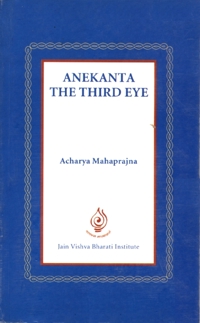
Anekanta is a very significant sutra for knowing the future, learning from the past and for living in the present. Anekanta does not rule out the future but keeps the past modes in mind and then arrives at the conclusion on the basis of the present. Anekanta is a three-dimensional vision. It is not a single dimensional vision. It keeps as its foundation all the three time zones and three dimensions.
The time-relative vision ensures practical success. Where time is not taken into consideration many problems occur. A person puts in effort. Sometimes when he does not succeed, he feels unhappy. He feels he has put in so much effort and yet nothing has happened. That person is upset because he does not know anekanta. If he did know anekanta, then he would never be upset. He would think of hard work as the present mode but he would also know that if a man puts in effort, physically and mentally and yet is not successful, then there must be some other obstacle. That is the subtle unmanifested mode created from past deeds, which is creating a barrier. Without considering the past, the present cannot be defined. The future cannot be explained without considering the present and the past. The present is the time of fruition. The present is the time for results, for creation. The present is influenced by the past and influences the future. The link between the past and the future is the present. One cannot imagine a present that is completely free from influences of the past. Psychologists listen to past events and analyze them to make the diagnosis. They make the patient relax and reconstruct the past. He listens carefully to the sequence of events in the past and gets to the root of the problem. By listening to the past events itself the doctor is able to understand what and when and how the patient has been affected and his mental make-up. Without the past, the present cannot be defined. A psychologist keeps heredity also in mind while treating the patient. Without that he does not arrive at any conclusion. No conclusion can be arrived at on the basis of the present alone. The past is relative to the present and so the conclusions drawn should also be relative to the past and the present. Both cannot be divided. Future possibilities are also based on the past and the present. The future cannot be decided free from considerations of the present. Today's religious men talk in detail about the future ignoring the present. It is said that religion can brighten the future even if the present is not good. With religion the heavens are improved, even if this world is not. This argument does not worry about the present. One cannot project a future that is not based on the present. One cannot look into the future by breaking away from the present. By breaking the sequence of the present a future order cannot be visualized. Action and results are both relative. They cannot be cut off from each other. How relative is the anekantic perspective! Then how can one say that anekanta complicates? Can any principle be explained without understanding anekanta or the principle of relativity? Can the true nature of substance or life be explained without it? Never. The whole life cycle, the entire course of life cannot be explained without anekanta.
A certain man was in need of money. Another man told him, “You give me both your legs and I will give you Rs. 5000." The man plagued by poverty exclaimed, “What! Give my legs? You want me to become lame? How can I go through the journey of life without legs? No I cannot give my legs." How can we understand this decision? Is it objective (an absolute decision)? No, it is relative to emotion and present state. One does not know under what circumstances what events take place.
Sometimes a man has to lose his legs also. A road accident resulted in great damage. The doctor advised that the legs should be amputated otherwise it meant danger to life itself. The surgery cost Rs 5000. Now there was a man offering Rs 5000 for the pair of legs and here he had to spend that Rs 5000. A man who is not willing to lose his legs for a price of Rs 10,000 may allow amputation paying Rs 5000. If viewed from a single perspective then the man may not allow amputation even in this state and would lose his very life.
Many people think and speak this single dimensional language. They say the decision they have taken is final. Even when situations change, their decision does not. Nothing is permanent. Even the one whom we call Parmatma is not so unchanging, then why should our decisions be?
 Acharya Mahaprajna
Acharya Mahaprajna
